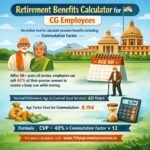Dopt Orders: Permission for Employment After Retirement
The Department of Personnel and Training (DOPT) has issued orders regarding the post-retirement employment of pensioners. The procedure for granting permission to pensioners for commercial employment after retirement has been revised, including changes to Form 25. This revised process makes it easier for pensioners to seek permission for employment after they retire, giving them more flexibility in their post-retirement career paths. By streamlining this process, the DOPT aims to provide more opportunities for retired individuals to continue their professional journeys while also ensuring that there is no misuse of post-retirement benefits.
No. 27012/3/2014-Estt (A)
Government of India
Ministry of Personnel, Public Grievances and Pensions
(Department of Personnel and Training)
North Block, New Delhi the 19th November, 2014
OFFICE MEMORANDUM
Subject: Procedure for grant of permission to the pensioners for commercial employment after retirement — revision of Form 25.
The undersigned is directed to refer to Rule 10 of CCS (Pension) Rules, 1972 and to say that retired Government servants proposing to take up commercial employment within a year of retirement are required to seek permission from the Government. They are required to apply for permission in Form 25 of CCS(Pension) Rules. Form 25 prescribed under the said rule has since been reviewed with a view to simplify the procedure. The revised Form 25 is enclosed.
2. The revised form incorporates the conditions prescribed in clauses (b) to (f) of sub-Rule 3 of Rule 10. There is now no requirement for obtaining an affidavit as prescribed in Para 2(d) of this Departments’ 0M No. 27012/5/2000-Estt.(A) dated 5th December, 2006.
3. All Ministries/Departments are requested to bring this to the notice of all concerned.
4. Formal Notification of Rules will follow.
sd/-
(G. Jayanthi)
Director
Source :www.persmin.gov.in
Yes, in some cases, you can work after retirement.
It depends on your specific situation and the regulations of your country or employer.
You can consult your local labor laws or your former employer’s policies to determine if permission is required.
If permission is required, you may need to approach your previous employer or relevant authorities to obtain the necessary approvals.
Some countries or employers may impose restrictions on the type of work or number of hours you can work after retirement. It is advisable to check the applicable guidelines.
Tax obligations vary based on your location and overall income. Consult a tax professional or relevant authorities for guidance on tax obligations for post-retirement employment.
This varies depending on the rules and regulations of your pension scheme or retirement benefits. It is recommended to contact your pension administrator or human resources department for clarification.
Working after retirement can provide financial stability, social engagement, and personal fulfillment. It can also help you stay active and maintain a sense of purpose.
This depends on the pension scheme and the regulations in your country. Some pension schemes might reduce or suspend payments if you earn above a certain threshold. It is best to consult with your pension provider to understand the specifics.
Yes, you can choose to stop working after retirement if it is within the terms and conditions of your employment agreement or local labor laws. Please consult your employer or relevant authorities for the necessary steps and implications.




Leave a Reply